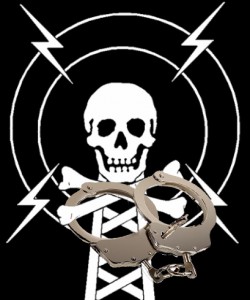 The Massachusetts legislature is considering a bill to make unlicensed broadcasting illegal, joining New York, New Jersey and Florida with state laws prohibiting pirate radio on the books. As John Anderson reports, the Massachusetts bill would not make it a crime, but rather permit the Attorney General to take legal action that may result in an injunction, a fine or equipment seizure.
The Massachusetts legislature is considering a bill to make unlicensed broadcasting illegal, joining New York, New Jersey and Florida with state laws prohibiting pirate radio on the books. As John Anderson reports, the Massachusetts bill would not make it a crime, but rather permit the Attorney General to take legal action that may result in an injunction, a fine or equipment seizure.
Like other state laws against unlicensed broadcasting, the Massachusetts bill was pushed by broadcasters, who complain about pirate stations, particularly in the Boston area. Touch 106.1 is arguably the most brazen unlicensed broadcaster in that city. Its founder is running for mayor and the station recently hired veteran Boston broadcaster Jimmy Myers.
While local authorities in Florida very frequently enforce that state’s anti-pirate laws, such enforcement is rare in New York and New Jersey. That rarity is evidenced by how much attention was garnered by the bust of a Brooklyn-based pirate broadcasting Caribbean programming.
To date, I have found no reports of an arrest for unlicensed broadcasting in New Jersey.
But arrests are one thing, convictions are another. Since these laws went on the books, I have found no reports of a radio pirate being convicted or going to jail. In one prominent case, a retired air traffic controller named Albert Knighten made a plea deal for 20 hours of community service, with the criminal charges to be dropped after completion.
Now it certainly is possible that other convictions might not have been reported by the press. But given how much publicity these arrests receive I would find it strange if convictions didn’t receive at least as much attention. More likely, arrested broadcasters are either striking plea deals like Albert Knighten, or they’re mounting successful defenses in court. A third option is that the charges aren’t standing in the first place, and accused pirates are walking. But those are results the FCC, local authorities and local broadcasters wouldn’t be crowing about if they hope to keep up the threat against Florida’s flourishing pirate scene.
With the legal threat even more diminished in the Massachusetts bill, its most interesting provision gives licensed broadcasters the right to sue unlicensed broadcasters in court for monetary relief. This might actually be the stronger threat, since mounting a civil court defense may be prohibitively expensive for most radio pirates.
Of course, they have to be identified and caught first.


